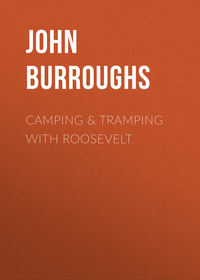 полная версия
полная версияWays of Nature
My neighbor met in the woods a black snake that had just swallowed a red squirrel. Now your romance-naturalist may take such a fact as this and make as pretty a story of it as he can. He may ascribe to the snake and his victim all the human emotions he pleases. He may make the snake glide through the tree-tops from limb to limb, and from tree to tree, in pursuit of its prey: the main thing is, the snake got the squirrel. If our romancer makes the snake fascinate the squirrel, I shall object, because I don't believe that snakes have this power. People like to believe that they have. It would seem as if this subtle, gliding, hateful creature ought to have some such mysterious gift, but I have no proof that it has. Every year I see the black snake robbing birds'-nests, or pursued by birds whose nests it has just plundered, but I have yet to see it cast its fatal spell upon a grown bird. Or, if our romancer says that the black snake was drilled in the art of squirrel-catching by its mother, I shall know he is a pretender.
Speaking of snakes reminds me of an incident I have several times witnessed in our woods in connection with a snake commonly called the sissing or blowing adder. When I have teased this snake a few moments with my cane, it seems to be seized with an epileptic or cataleptic fit. It throws itself upon its back, coiled nearly in the form of a figure eight, and begins a series of writhings and twistings and convulsive movements astonishing to behold. Its mouth is open and presently full of leaf-mould, its eyes are covered with the same, its head is thrown back, its white belly up; now it is under the leaves, now out, the body all the while being rapidly drawn through this figure eight, so that the head and tail are constantly changing place. What does it mean? Is it fear? Is it a real fit? I do not know, but any one of our romance-naturalists could tell you at once. I can only suggest that it may be a ruse to baffle its enemy, the black snake, when he would attempt to crush it in his folds, or to seize its head when he would swallow it.
I am reminded of another mystery connected with a snake, or a snake-skin, and a bird. Why does our great crested flycatcher weave a snake-skin into its nest, or, in lieu of that, something that suggests a snake-skin, such as an onion-skin, or fish-scales, or a bit of oiled paper? It is thought by some persons that it uses the snake-skin as a kind of scarecrow, to frighten away its natural enemies. But think what this purpose in the use of it would imply. It would imply that the bird knew that there were among its enemies creatures that were afraid of snakes – so afraid of them that one of their faded and cast-off skins would keep these enemies away. How could the bird obtain this knowledge? It is not afraid of the skin itself; why should it infer that squirrels, for instance, are? I am convinced there is nothing in this notion. In all the nests that have come under my observation, the snake-skin was in faded fragments woven into the texture of the nest, and one would not be aware of its presence unless he pulled the nest to pieces. True, Mr. Frank Bolles reports finding a nest of this bird with a whole snake-skin coiled around a single egg; but it was the skin of a small garter-snake, six or seven inches long, and could not therefore have inspired much terror in the heart of the bird's natural enemies. Dallas Lore Sharp, author of that delightful book, "Wild Life Near Home," tells me he has seen a whole skin dangling nearly its entire length from the hole that contained the nest, just as he has seen strings hanging from the nest of the kingbird. The bird was too hurried or too careless to pull in the skin. Mr. Sharp adds that he cannot "give the bird credit for appreciating the attitude of the rest of the world toward snakes, and making use of the fear." Moreover, a cast-off snake-skin looks very little like a snake. It is thin, shrunken, faded, papery, and there is no terror in it. Then, too, it is dark in the cavity of the nest, consequently the skin could not serve as a scarecrow in any case. Hence, whatever its purpose may be, it surely is not that. It looks like a mere fancy or whim of the bird. There is that in its voice and ways that suggests something a little uncanny. Its call is more like the call of the toad than that of a bird. If the toad did not always swallow its own cast-off skin, the bird would probably use that too.
At the best we can only guess at the motives of the birds and beasts. As I have elsewhere said, they nearly all have reference in some way to the self-preservation of these creatures. But how the bits of an old snake-skin in a bird's nest can contribute specially to this end, I cannot see.
Nature is not always consistent; she does not always choose the best means to a given end. For instance, all the wrens except our house wren seem to use about the best material at hand for their nests. What can be more unsuitable, untractable, for a nest in a hole or cavity than the twigs the house wren uses? Dry grasses or bits of soft bark would bend and adapt themselves easily to the exigencies of the case; but stiff, unyielding twigs! What a contrast to the suitableness of the material the hummingbird uses – the down of some plant, which seems to have a poetic fitness!
Yesterday in my walk I saw where a red squirrel had stripped the soft outer bark off a group of red cedars to build its winter's nest with. This also seemed fit, – fit that such a creature of the trees should not go to the ground for its nest-material, and should choose something soft and pliable. Among the birches, it probably gathers the fine curling shreds of the birch bark.
Beside my path in the woods a downy woodpecker, late one fall, drilled a hole in the top of a small dead black birch for his winter quarters. My attention was first called to his doings by the white chips upon the ground. Every day as I passed I would rap upon his tree, and if he was in he would appear at his door and ask plainly enough what I wanted now. One day when I rapped, something else appeared at the door – I could not make out what. I continued my rapping, when out came two flying-squirrels. On the tree being given a vigorous shake, it broke off at the hole, and the squirrels went sliding down the air to the foot of a hemlock, up which they disappeared. They had dispossessed Downy of his house, had carried in some grass and leaves for a nest, and were as snug as a bug in a rug. Downy drilled another cell in a dead oak farther up the hill, and, I hope, passed the winter there unmolested. Such incidents, comic or tragic, as they chance to strike us, are happening all about us, if we have eyes to see them.
The next season, near sundown of a late November day, I saw Downy trying to get possession of a hole not his own. I chanced to be passing under a maple, when white chips upon the ground again caused me to scrutinize the branches overhead. Just then I saw Downy come to the tree, and, hopping around on the under side of a large dry limb, begin to make passes at something with his beak. Presently I made out a round hole there, with something in it returning Downy's thrusts. The sparring continued some moments. Downy would hop away a few feet, then return to the attack, each time to be met by the occupant of the hole. I suspected an English sparrow had taken possession of Downy's cell in his absence during the day, but I was wrong. Downy flew to another branch, and I tossed up a stone against the one that contained the hole, when, with a sharp, steely note, out came a hairy woodpecker and alighted on a near-by branch. Downy, then, had the "cheek" to try to turn his large rival out of doors – and it was Hairy's cell, too; one could see that by the size of the entrance. Thus loosely does the rule of meum and tuum obtain in the woods. There is no moral code in nature. Might reads right. Man in communities has evolved ethical standards of conduct, but nations, in their dealings with one another, are still largely in a state of savage nature, and seek to establish the right, as dogs do, by the appeal to battle.
One season a wood duck laid her eggs in a cavity in the top of a tall yellow birch near the spring that supplies my cabin with water. A bold climber "shinned" up the fifty or sixty feet of rough tree-trunk and looked in upon the eleven eggs. They were beyond the reach of his arm, in a well-like cavity over three feet deep. How would the mother duck get her young up out of that well and down to the ground? We watched, hoping to see her in the act. But we did not. She may have done it at night or very early in the morning. All we know is that when Amasa one morning passed that way, there sat eleven little tufts of black and yellow down in the spring, with the mother duck near by. It was a pretty sight. The feat of getting down from the tree-top cradle had been safely effected, probably by the young clambering up on the inside walls of the cavity and then tumbling out into the air and coming down gently like huge snowflakes. They are mostly down, and why should they not fall without any danger to life or limb? The notion that the mother duck takes the young one by one in her beak and carries them to the creek is doubtless erroneous. Mr. William Brewster once saw the golden-eye, whose habits of nesting are like those of the wood duck, get its young from the nest to the water in this manner: The mother bird alighted in the water under the nest, looked all around to see that the coast was clear, and then gave a peculiar call. Instantly the young shot out of the cavity that held them, as if the tree had taken an emetic, and came softly down to the water beside their mother. Another observer assures me that he once found a newly hatched duckling hung by the neck in the fork of a bush under a tree in which a brood of Wood ducks had been hatched.
The ways of nature, – who can map them, or fathom them, or interpret them, or do much more than read a hint correctly here and there? Of one thing we may be pretty certain, namely, that the ways of wild nature may be studied in our human ways, inasmuch as the latter are an evolution from the former, till we come to the ethical code, to altruism and self-sacrifice. Here we seem to breathe another air, though probably this code differs no more from the animal standards of conduct than our physical atmosphere differs from that of early geologic time.
Our moral code must in some way have been evolved from our rude animal instincts. It came from within; its possibilities were all in nature. If not, where were they?
I have seen disinterested acts among the birds, or what looked like such, as when one bird feeds the young of another species when it hears them crying for food. But that a bird would feed a grown bird of another species, or even of its own, to keep it from starving, I have my doubts. I am quite positive that mice will try to pull one of their fellows out of a trap, but what the motive is, who shall say? Would the same mice share their last crumb with their fellow if he were starving? That, of course, would be a much nearer approach to the human code, and is too much to expect. Bees will clear their fellows of honey, but whether it be to help them, or to save the honey, is a question.
In my youth I saw a parent weasel seize one of its nearly grown young which I had wounded and carry it across an open barway, in spite of my efforts to hinder it. A friend of mine, who is a careful observer, says he once wounded a shrike so that it fell to the ground, but before he got to it, it recovered itself and flew with difficulty toward some near trees, calling to its mate the while; the mate came and seemed to get beneath the wounded bird and buoy it up, so aiding it that it gained the top of a tall tree, where my friend left it. But in neither instance can we call this helpfulness entirely disinterested, or pure altruism.
Emerson said that he was an endless experimenter with no past at his back. This is just what Nature is. She experiments endlessly, seeking new ways, new modes, new forms, and is ever intent upon breaking away from the past. In this way, as Darwin showed, she attains to new species. She is blind, she gropes her way, she trusts to luck; all her successes are chance hits. Whenever I look over my right shoulder, as I sit at my desk writing these sentences, I see a long shoot of a honeysuckle that came in through a crack of my imperfectly closed window last summer. It came in looking, or rather feeling, for something to cling to. It first dropped down upon a pile of books, then reached off till it struck the window-sill of another large window; along this it crept, its regular leaves standing up like so many pairs of green ears, looking very pretty. Coming to the end of the open way there, it turned to the left and reached out into vacancy, till it struck another window-sill running at right angles to the former; along this it traveled nearly half an inch a day, till it came to the end of that road. Then it ventured out into vacant space again, and pointed straight toward me at my desk, ten feet distant. Day by day it kept its seat upon the window-sill, and stretched out farther and farther, almost beckoning me to give it a lift or to bring it support. I could hardly resist its patient daily appeal. Late in October it had bridged about three feet of the distance that separated us, when, one day, the moment came when it could maintain itself outright in the air no longer, and it fell to the floor. "Poor thing," I said, "your faith was blind, but it was real. You knew there was a support somewhere, and you tried all ways to find it." This is Nature. She goes around the circle, she tries every direction, sure that she will find a way at some point. Animals in cages behave in a similar way, looking for a means of escape. In the vineyard I see the grape-vines reaching out blindly in all directions for some hold for their tendrils. The young arms seize upon one another and tighten their hold as if they had at last found what they were in search of. Stop long enough beside one of the vines, and it will cling to you and run all over you.
Behold the tumble-bug with her ball of dung by the roadside; where is she going with it? She is going anywhere and everywhere; she changes her direction, like the vine, whenever she encounters an obstacle. She only knows that somewhere there is a depression or a hole in which her ball with its egg can rest secure, and she keeps on tumbling about till she finds it, or maybe digs one, or comes to grief by the foot of some careless passer-by. This, again, is Nature's way, randomly and tirelessly seeking her ends. When we look over a large section of history, we see that it is man's way, too, or Nature's way in man. His progress has been a blind groping, the result of endless experimentation, and all his failures and mistakes could not be written in a book. How he has tumbled about with his ball, seeking the right place for it, and how many times has he come to grief! All his successes have been lucky hits: steam, electricity, representative government, printing – how long he groped for them before he found them! There is always and everywhere the Darwinian tendency to variation, to seek new forms, to improve upon the past; and man is under this law, the same as is the rest of nature. One generation of men, like one generation of leaves, becomes the fertilizer of the next; failures only enrich the soil or make smoother the way.
There are so many conflicting forces and interests, and the conditions of success are so complex! If the seed fall here, it will not germinate; if there, it will be drowned or washed away; if yonder, it will find too sharp competition. There are only a few places where it will find all the conditions favorable. Hence the prodigality of Nature in seeds, scattering a thousand for one plant or tree. She is like a hunter shooting at random into every tree or bush, hoping to bring down his game, which he does if his ammunition holds out long enough; or like the British soldier in the Boer War, firing vaguely at an enemy that he does not see. But Nature's ammunition always holds out, and she hits her mark in the end. Her ammunition on our planet is the heat of the sun. When this fails, she will no longer hit the mark or try to hit it.
Let there be a plum tree anywhere with the disease called the "black-knot" upon it, and presently every plum tree in its neighborhood will have black knots. Do you think the germs from the first knot knew where to find the other plum trees? No; the wind carried them in every direction, where the plum trees were not as well as where they were. It was a blind search and a chance hit. So with all seeds and germs. Nature covers all the space, and is bound to hit the mark sooner or later. The sun spills his light indiscriminately into space; a small fraction of his rays hit the earth, and we are warmed. Yet to all intents and purposes it is as if he shone for us alone.
II
BIRD-SONGS
I suspect it requires a special gift of grace to enable one to hear the bird-songs; some new power must be added to the ear, or some obstruction removed. There are not only scales upon our eyes so that we do not see, there are scales upon our ears so that we do not hear. A city woman who had spent much of her time in the country once asked a well-known ornithologist to take her where she could hear the bluebird. "What, never heard the bluebird!" said he. "I have not," said the woman. "Then you will never hear it," said the bird-lover; never hear it with that inward ear that gives beauty and meaning to the note. He could probably have taken her in a few minutes where she could have heard the call or warble of the bluebird; but it would have fallen upon unresponsive ears – upon ears that were not sensitized by love for the birds or associations with them. Bird-songs are not music, properly speaking, but only suggestions of music. A great many people whose attention would be quickly arrested by the same volume of sound made by a musical instrument or by artificial means never hear them at all. The sound of a boy's penny whistle there in the grove or the meadow would separate itself more from the background of nature, and be a greater challenge to the ear, than is the strain of the thrush or the song of the sparrow. There is something elusive, indefinite, neutral, about bird-songs that makes them strike obliquely, as it were, upon the ear; and we are very apt to miss them. They are a part of nature, the Nature that lies about us, entirely occupied with her own affairs, and quite regardless of our presence. Hence it is with bird-songs as it is with so many other things in nature – they are what we make them; the ear that hears them must be half creative. I am always disturbed when persons not especially observant of birds ask me to take them where they can hear a particular bird, in whose song they have become interested through a description in some book. As I listen with them, I feel like apologizing for the bird: it has a bad cold, or has just heard some depressing news; it will not let itself out. The song seems so casual and minor when you make a dead set at it. I have taken persons to hear the hermit thrush, and I have fancied that they were all the time saying to themselves, "Is that all?" But should one hear the bird in his walk, when the mind is attuned to simple things and is open and receptive, when expectation is not aroused and the song comes as a surprise out of the dusky silence of the woods, then one feels that it merits all the fine things that can be said of it.
One of our popular writers and lecturers upon birds told me this incident: He had engaged to take two city girls out for a walk in the country, to teach them the names of the birds they might see and hear. Before they started, he read to them Henry van Dyke's poem on the song sparrow, – one of our best bird-poems, – telling them that the song sparrow was one of the first birds they were likely to hear. As they proceeded with their walk, sure enough, there by the roadside was a sparrow in song. The bird man called the attention of his companions to it. It was some time before the unpracticed ears of the girls could make it out; then one of them said (the poem she had just heard, I suppose, still ringing in her ears), "What! that little squeaky thing?" The sparrow's song meant nothing to her at all, and how could she share the enthusiasm of the poet? Probably the warble of the robin, or the call of the meadowlark or of the highhole, if they chanced to hear them, meant no more to these girls. If we have no associations with these sounds, they will mean very little to us. Their merit as musical performances is very slight. It is as signs of joy and love in nature, as heralds of spring, and as the spirit of the woods and fields made audible, that they appeal to us. The drumming of the woodpeckers and of the ruffed grouse give great pleasure to a countryman, though these sounds have not the quality of real music. It is the same with the call of the migrating geese or the voice of any wild thing: our pleasure in them is entirely apart from any considerations of music. Why does the wild flower, as we chance upon it in the woods or bogs, give us more pleasure than the more elaborate flower of the garden or lawn? Because it comes as a surprise, offers a greater contrast with its surroundings, and suggests a spirit in wild nature that seems to take thought of itself and to aspire to beautiful forms.
The songs of caged birds are always disappointing, because such birds have nothing but their musical qualities to recommend them to us. We have separated them from that which gives quality and, meaning to their songs. One recalls Emerson's lines: —
"I thought the sparrow's note from heaven,Singing at dawn on the alder bough;I brought him home, in his nest, at even;He sings the song, but it cheers not now,For I did not bring home the river and sky; —He sang to my ear, – they sang to my eye."I have never yet seen a caged bird that I wanted, – at least, not on account of its song, – nor a wild flower that I wished to transfer to my garden. A caged skylark will sing its song sitting on a bit of turf in the bottom of the cage; but you want to stop your ears, it is so harsh and sibilant and penetrating. But up there against the morning sky, and above the wide expanse of fields, what delight we have in it! It is not the concord of sweet sounds: it is the soaring spirit of gladness and ecstasy raining down upon us from "heaven's gate."
Then, if to the time and the place one could only add the association, or hear the bird through the vista of the years, the song touched with the magic of youthful memories! One season a friend in England sent me a score of skylarks in a cage. I gave them their liberty in a field near my place. They drifted away, and I never heard them or saw them again. But one Sunday a Scotchman from a neighboring city called upon me, and declared with visible excitement that on his way along the road he had heard a skylark. He was not dreaming; he knew it was a skylark, though he had not heard one since he had left the banks of the Doon, a quarter of a century or more before. What pleasure it gave him! How much more the song meant to him than it would have meant to me! For the moment he was on his native heath again. Then I told him about the larks I had liberated, and he seemed to enjoy it all over again with renewed appreciation.
Many years ago some skylarks were liberated on Long Island, and they became established there, and may now occasionally be heard in certain localities. One summer day a friend of mine was out there observing them; a lark was soaring and singing in the sky above him. An old Irishman came along, and suddenly stopped as if transfixed to the spot; a look of mingled delight and incredulity came into his face. Was he indeed hearing the bird of his youth? He took off his hat, turned his face skyward, and with moving lips and streaming eyes stood a long time regarding the bird. "Ah," my friend thought, "if I could only hear that song with his ears!" How it brought back his youth and all those long-gone days on his native hills!
The power of bird-songs over us is so much a matter of association that every traveler to other countries finds the feathered songsters of less merit than those he left behind. The stranger does not hear the birds in the same receptive, uncritical frame of mind as does the native; they are not in the same way the voices of the place and the season. What music can there be in that long, piercing, far-heard note of the first meadowlark in spring to any but a native, or in the "o-ka-lee" of the red-shouldered starling as he rests upon the willows in March? A stranger would probably recognize melody and a wild woodsy quality in the flutings of the veery thrush; but how much more they would mean to him after he had spent many successive Junes threading our northern trout-streams and encamping on their banks! The veery will come early in the morning, and again at sundown, and perch above your tent, and blow his soft, reverberant note for many minutes at a time. The strain repeats the echoes of the limpid stream in the halls and corridors of the leafy woods.









